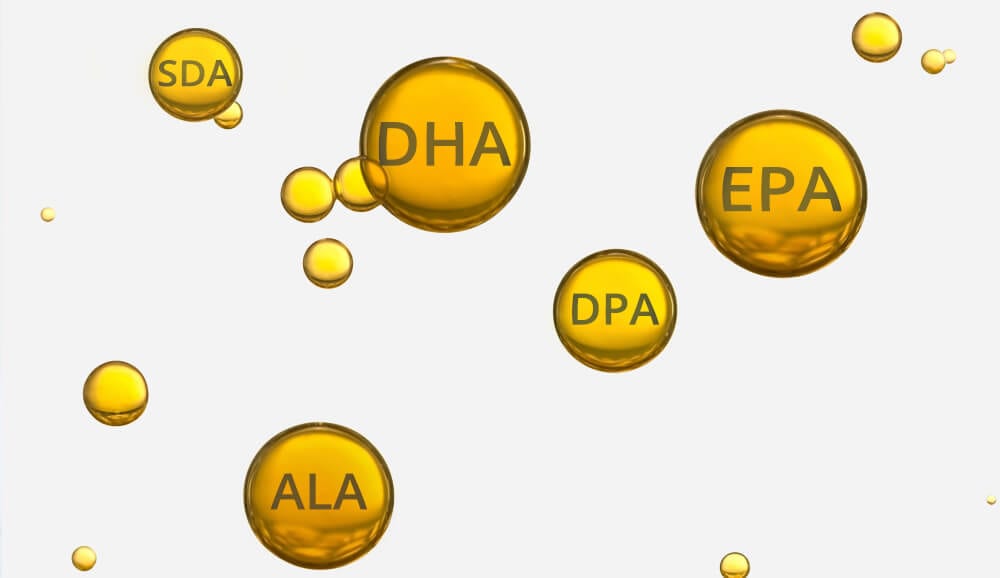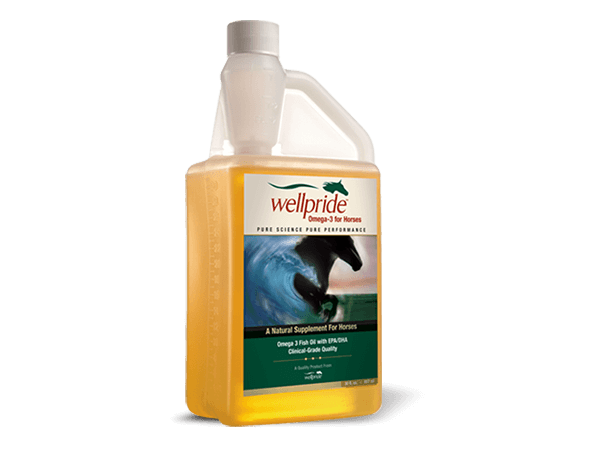Fighting EIPH with Omega-3 Fish Oil
The horse is a tremendous athlete. No other animal allows humans to race at speeds of 45 miles per hour or more, fly over obstacles, travel large distances in a single day, or make amazingly quick turns and spins as the horse.
But sometimes our horses don’t perform at their best…after all, illnesses and injury plague many horse owners and their charges. One of the most frustrating and common challenges includes Exercise-Induced Pulmonary Hemorrhage (EIPH), also known as a “bleeding.”
What Is EIPH?
When a horse has EIPH, he is suffering from hemorrhages in the lungs due to a rupture of capillaries during intense exercise. This results in bleeding in the airways. Horse owners may notice a decrease in athletic performance, coughing or swallowing right after exercise, and bleeding from one or both nostrils.
EIPH is common in racehorses of all kinds (flat racers, steeplechasers, harness racers, Quarter Horse racers) and other high-performance horses, such as eventers and barrel racers.
EIPH horses are often treated with furosemide (known as Lasix). However, Lasix is banned at many competitions and racetracks due to its potent diuretic effect, which can reduce a horse’s body weight and cause a potentially unfair competitive advantage.
Lasix is supposed to reduce plasma volume, cardiac output, and pulmonary vascular pressure. But its effect on reducing blood pressure in the lung capillaries has been under debate. In addition, according to a review by two researchers from the University of Pennsylvania, even if hemorrhaging is affected by Lasix, it is often only reduced and not prevented (1). Study results on Lasix since that review have been inconclusive.
The Benefits of Omega-3s for EIPH
Omega-3 supplementation — particularly with eicosapentaenoic acid (EPA) and docosahexaenoic acid (DHA) — can be a beneficial and affordable non-pharmaceutical option for treating EIPH. There are several functions of omega-3 fatty acids that can work to improve and possibly prevent bleeding:
Omega-3s Reduce Inflammation
EIPH has often been connected with other respiratory conditions, such as inflammatory airway disease (IAD). As the name indicates, IAD produces an inflammatory response in the airways during exercise. Since omega-3s are known to reduce inflammation and boost the immune system, ensuring your horse consumes high-quality sources of omega-3s could help reduce or prevent this inflammatory response.
Of the omega-3 fatty acids, it is particularly the EPA and DHA variety found in fish oil that puts a damper on the inflammation response. They provide the substrates for the newly discovered protectins and resolvins, which do exactly what their name says: they protect against and resolve inflammation. The resolvins and protectins are important for helping shut down the ongoing inflammation in the body and limiting tissue damage (2).

Omega-3s Improve the Flexibility of the Blood Vessels
During exercise, heart rate increases, blood thickens, and the number of red blood cells circulating in the blood increases. Research has shown that omega-3 supplementation can affect the flexibility and elasticity of cell membranes (3), protect red blood cell membrane fragility, reduce the number of red blood cells in the airways, and lower overall heart rate (4). This increase in flexibility and elasticity allows blood to flow more easily through narrow blood vessels during exercise. This in turn makes the blood vessels less prone to tearing and causing hemorrhaging during exercise.
Choosing the Best Omega-3 Supplement Source
Omega-3 fatty acids are a family of molecules, all of which have different roles in the body. The fatty acids include EPA, DHA, ALA, and several other less well known types. The ALA variety is what you find in plant sources, like flaxseed and chia seeds. Algae source contain only DHA. Natural fish oils, however, contain all the types of omega-3, including EPA, DHA and ALA.
Preliminary research from Kansas State University has indicated that supplementing EPA and DHA from fish oil may reduce EIPH. In contrast, the researchers found that a diet enriched with just DHA did not have the same effect.
Studies from other species and humans echo the benefits of fish oil for similar breathing conditions. A human study showed that fish oil supplementation reduced the severity of exercised-induced bronchoconstriction in elite athletes (5).
A 2016 study in mice challenged with ovalbumin (OVA)-induced allergic lung inflammation found that dietary enrichment with 20% fish oil decreased mucus production in lung tissues and decreased inflammatory cells (6).
In Summary
With the ongoing prevalence of EIPH in high-performance horses, research will continue in this area. However, horse owners don’t need to wait on some “miracle cure” to be developed in order to help their horses achieve better lung function.
Adding fish oil, with its beneficial EPA and DHA, can help our equine athletes in this health area and provide other benefits with few downsides.

References:
1. Soma LR, Uboh CE. Review of furosemide in horse racing: its effects and regulations. J Vet Pharmacol Ther. 1998 Jun; 21(3): 228-40. https://www.ncbi.nlm.nih.gov/pubmed/9673965
2. Calder PC. Omega-3 Fatty Acids and Inflammatory Processes. Nutrients. 2010;2(3):355-374. doi:10.3390/nu2030355. https://www.ncbi.nlm.nih.gov/pmc/articles/PMC3257651/.
3. Portier, K. 2006. The effects of dietary n-3 and antioxidant supplementation on erythrocyte membrane fatty acid composition and fluidity in exercising horses. Eq. Vet. J. Suppl. 2006 Aug;(36):279-284. onlinelibrary.wiley.com/doi/10.1111/j.2042-3306.2006.tb05553.x/abstract
4. O’Connor, CI. 2004. The effect of dietary fish oil supplementation on exercising horses. J Anim Sci. 2004 Oct; 82(10): 2978-84. https://www.ncbi.nlm.nih.gov/pubmed/15484950
5. Mickleborough, TD. 2003. Fish oil supplementation reduces severity of exercise-induced bronchoconstriction in elite athletes. Am J Respir Crit Care Med. 2003 Nov 15;168(10):1181-9. https://www.ncbi.nlm.nih.gov/pubmed/12904324
6. Hall, JA. 2016. Dietary Enrichment with 20% Fish Oil Decreases Mucus Production and the Inflammatory Response in Mice with Ovalbumin-Induced Allergic Lung Inflammation. PLoS One. 2016; 11(9): e0163819. https://www.ncbi.nlm.nih.gov/pmc/articles/PMC5036796/





